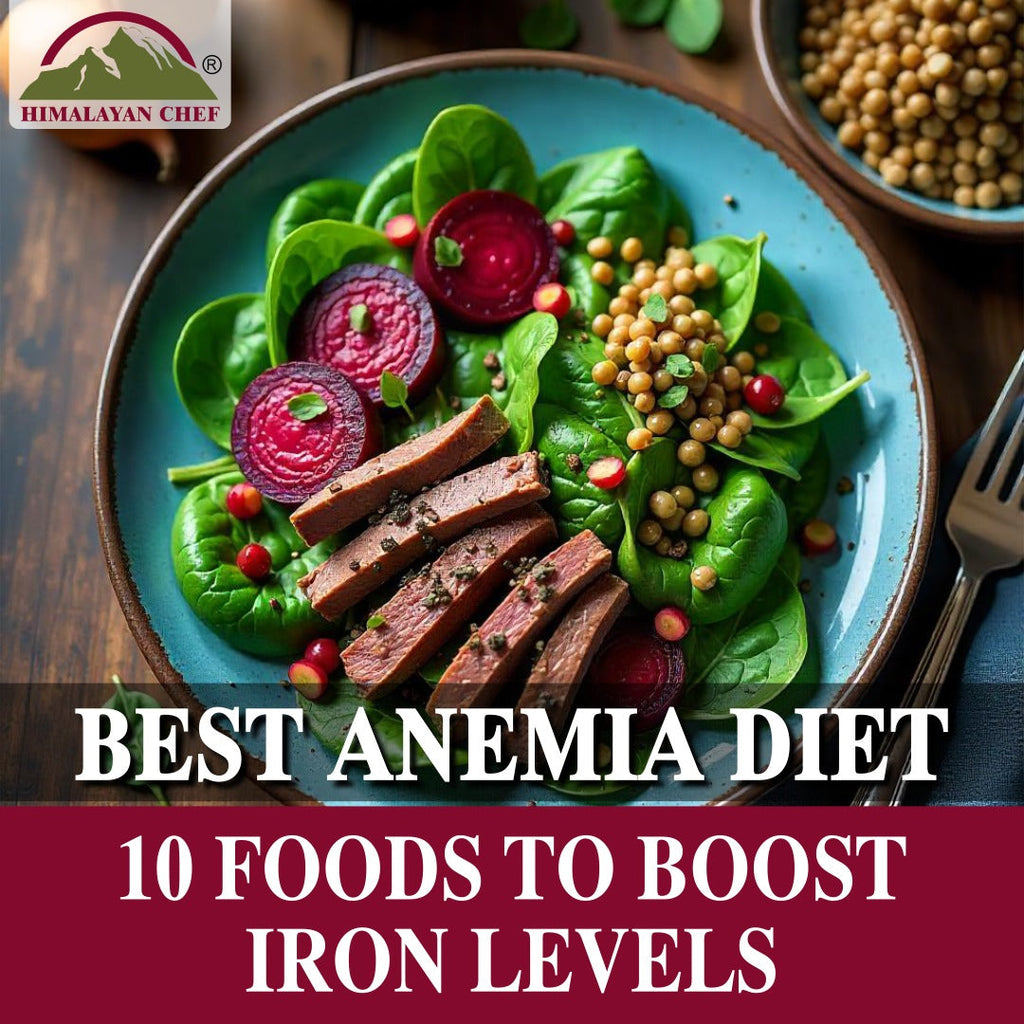Top 10 Iron-rich Foods to Prevent Anemia in Women
Posted by HIMALAYAN CHEF

Feeling tired, dizzy, or out of breath even after simple tasks? You might think it’s just workload stress or lack of sleep. But iron deficiency anemia is one of the leading causes of fatigue among women in Pakistan. According to the National Nutrition Survey, nearly 50% of women suffer from anemia due to poor diet, heavy periods, and lack of awareness about iron-rich foods.
Why is Anemia Common in Women?
Iron plays a critical role in making hemoglobin, the protein in red blood cells that carries oxygen throughout your body. Without enough iron, your body can’t produce healthy red blood cells, leading to:
- Weakness and fatigue
- Dizziness and headaches
- Pale skin and hair fall
- Shortness of breath and poor focus
Women are more vulnerable due to monthly blood loss during periods, pregnancy demands, and diets lacking heme iron.
Imagine waking up tired even after 8 hours of sleep. Struggling to focus at work, feeling irritable with family, and dragging yourself through chores. Anemia silently robs your energy and confidence, making you feel older and weaker than you are.
Thankfully, nature has provided us with iron-rich foods that can boost hemoglobin levels naturally, improve energy, and restore your glow. Let’s explore the Top 10 Iron-Rich Foods for Women that are easy to find, affordable, and delicious.
1. Spinach – The Green Iron Powerhouse
Spinach (palak) is packed with non-heme iron, folate, and Vitamin C which boosts iron absorption. 100g of cooked spinach gives nearly 3.6mg of iron.
Add curries, daal palak, green smoothies, or salads.
2. Lentils – Budget-Friendly Protein & Iron Combo
Lentils (daal) are a staple in every Pakistani kitchen. One cup cooked gives about 6.6mg of iron, along with protein and fiber to keep you full longer.
Use masoor, moong, or chana daal in curries, soups, or khichdi.
3. Red Meat – Easily Absorbed Heme Iron
Beef and mutton are excellent heme iron sources, absorbed better than plant iron. 100g of beef liver offers 6.5mg of iron.
Include beef curry, mutton stew, or grilled kebabs once or twice a week.
4. Chickpeas – Versatile Iron Boost
Chickpeas (chana) provide 4.7mg of iron per cup cooked. Affordable, versatile, and filling.
Make chana chaat, hummus, or add to pulao for an iron-packed meal.
5. Pumpkin Seeds – Tiny Seeds, Big Impact
Pumpkin seeds (kaddu ke beej) contain 4.2mg of iron per 28g serving along with magnesium and zinc.
Sprinkle on salads, oats, or eat roasted as snacks.
6. Quinoa – The Gluten-Free Iron Source
Quinoa provides 2.8mg of iron per cup cooked, plus protein and fiber. Ideal for gluten-free diets.
Replace white rice with quinoa in salads or pulao for added nutrition.
7. Beetroot – Iron & Blood Flow Enhancer
Beetroot (chukandar) has moderate iron (1.1mg per 100g) but improves blood flow and oxygenation due to nitrates.
Drink beetroot juice or add to salads for better hemoglobin levels.
8. Dark Chocolate – Sweet Iron Fix
Good quality dark chocolate (70% cocoa or higher) provides 3.3mg of iron per 28g serving along with antioxidants.
Enjoy a small piece daily for a healthy treat.
9. Dates – Natural Iron-Rich Energy Bites
Dates (khajoor) are rich in iron (0.9mg per 100g) plus potassium and natural sugars for instant energy.
Eat as snacks, add to smoothies, or blend into shakes.
10. Eggs—Affordable Everyday Iron
Eggs provide 1.2 mg of iron per large egg, especially in the yolk. Easily available and budget-friendly.
Include boiled eggs, omelets, or anda paratha in your breakfast.
Tips to Enhance Iron Absorption
- Pair iron-rich foods with Vitamin C sources like lemons, oranges, amla, or tomatoes.
- Avoid tea or coffee immediately after meals to prevent iron blockage.
- Cook in iron utensils to slightly increase food’s iron content.
Diet Plan for Iron deficiency Anemia for Women in Pakistan
Early Morning (6-7 AM)
- Warm water with lemon (Vitamin C for iron absorption)
- 2-3 dates (khajoor) for instant energy and iron boost
Breakfast (8-9 AM)
- 1 – 2 boiled eggs or omelet with spinach (anda palak)
- 1 glass fresh orange juice or amla juice (Vitamin C source)
Mid-Morning Snack (11 AM)
- Handful of roasted pumpkin seeds
- 1 cup beetroot and carrot salad with lemon squeezed on top
Lunch (1-2 PM)
- 1 cup cooked lentils (daal) with brown rice or quinoa pulao
- Mixed salad of chickpeas, cucumber, and tomatoes
Evening Snack (4-5 PM)
- Small piece of dark chocolate (70% cocoa or above)
- Green tea with lemon (avoid black tea immediately after meals)
Dinner (7-8 PM)
- Grilled beef kebabs or mutton curry
- 1 roti made with whole wheat flour
- Saag (spinach curry) or steamed spinach on the side
Before Bed (9-10 PM)
- Warm milk (if not iron supplement time)
- 2-3 soaked almonds or walnuts
Best Iron-rich Food Brand Online in Pakistan
At Himalayan Chef, we believe in nourishing your body with pure, natural, and chemical-free foods. Our range of iron-rich products—from premium Masoor Daal, Chickpeas, and Whole Wheat Flour to White beans and Dates—ensures you get the best nutrition to fight anemia and boost your energy naturally. With strict quality standards, mineral-rich Himalayan Pink Salt, and cold-pressed oils, we bring you authentic, unprocessed foods that preserve their natural iron content for maximum health benefits. Choose Himalayan Chef to fuel your daily meals with confidence, purity, and the taste of nature.
TAGS:
SHARE:


